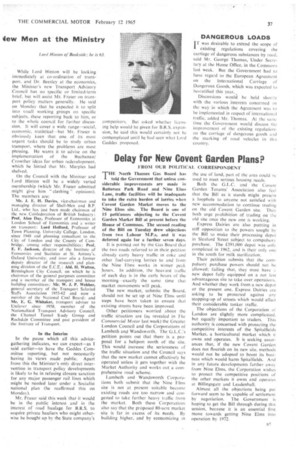Delay for New Covent Garden Plans?
Page 39

If you've noticed an error in this article please click here to report it so we can fix it.
FROM OUR POLITICAL CORRESPONDENT
'THE North Thames Gas Board has Itold the Government that unless considerable improvements are made in Battersea Park Road and Nine Elms Lane, traffic facilities will be inadequate to take the extra burden a lorries when Covent Garden Market moves to the Nine Elms site. The Board is one of 15 petit:Oners objecting to the Covent Garden Market Bill at present before the House of Commons. The second reading of the Bill on Tuesday drew objections from two Labour M.P.s, and it was deferred again for a further seven days.
It is pointed out by the Gas Board that the two roads referred to in their petition already carry heavy traffic in coke and other fuel-carrying lorries to and from the Nine Elms works in winter peak hours. In addition, the heaviest traffic of each day is in the early hours of the morning—exactly the same time that market movements will peak.
The new market, submits the Board. should not be set up at Nine Elms until steps have been taken to ensure that existing streets have been improved.
Other petitioners worried about the traffic situation are (as revealed in 1 he Commercial Motor last week) the Greater London Council and the Corporations of Lambeth and Wandsworth. The G.L.C.'s petition points out that there is a proposal for a heliport north of the site. This would increase the seriousness of the traffic situation and the Council says that the new market cannot effectively be operated unless it gets together with the Market Authority and works out a comprehensive road scheme.
Lambeth and Wandsworth Corporations both submit that the Nine Elms site is not at present suitable because existing roads are too narrow and congested to take further heavy traffic from the market. Both these Corporations also say that the proposed 80-acre market site is far in excess of its leeds, By building higher, and by economizing in
the use of land, part of the area could be used to meet serious housing needs.
Both the G.L.C. and the Covent Garden Tenants' Association also feel that, the Bill as it stands might present a loophole to anyone not satisfied with new accommodation to continue trading on the old Covent Garden site, Th4 both urge prohibition of trading on the old site once the new one is working.
Express Dairies are also punting in stiff opposition to the powers sought by the Bill to make their processing depot in Sleaford Street subject to compulsory purchase. The £391,000 depot was only completed in 1962, and is their only one in the south for milk sterilization, •
Their petition submits that the compulsory purchase powers should not be allowed; failing that, they must have a new depot fully equipped on a not less advantageous site to take over operations. And whether they work from a new depot or the present one, Express Dairies are asking to be protected against any stopping-up of streets which would affect their considerable tanker traffic.
The objections of the Corporation or -London are slightly more complicated. but equally important to traders. This authority is concerned with protecting the competitive interests of the Spitalfields Market, a horticultural market which it owns and operates. It is seeking assurances that, if the new Covent Garden does not flourish on its new site, methods would not be adopted to boost its business which would harm Spitalfields. And in any future developments farther away from Nine Elms. the Corporation wishes to protect the competitive positions of the other markets it owns and operates at Billingsgate and Leadenhall.
Almost all the objections being put forward seem to be capable of settlement by negotiation. The Government is hoping to get the Bill through during this session, because it is an essential first move towards getting Nine Elms into operation by 1972.






























































































































